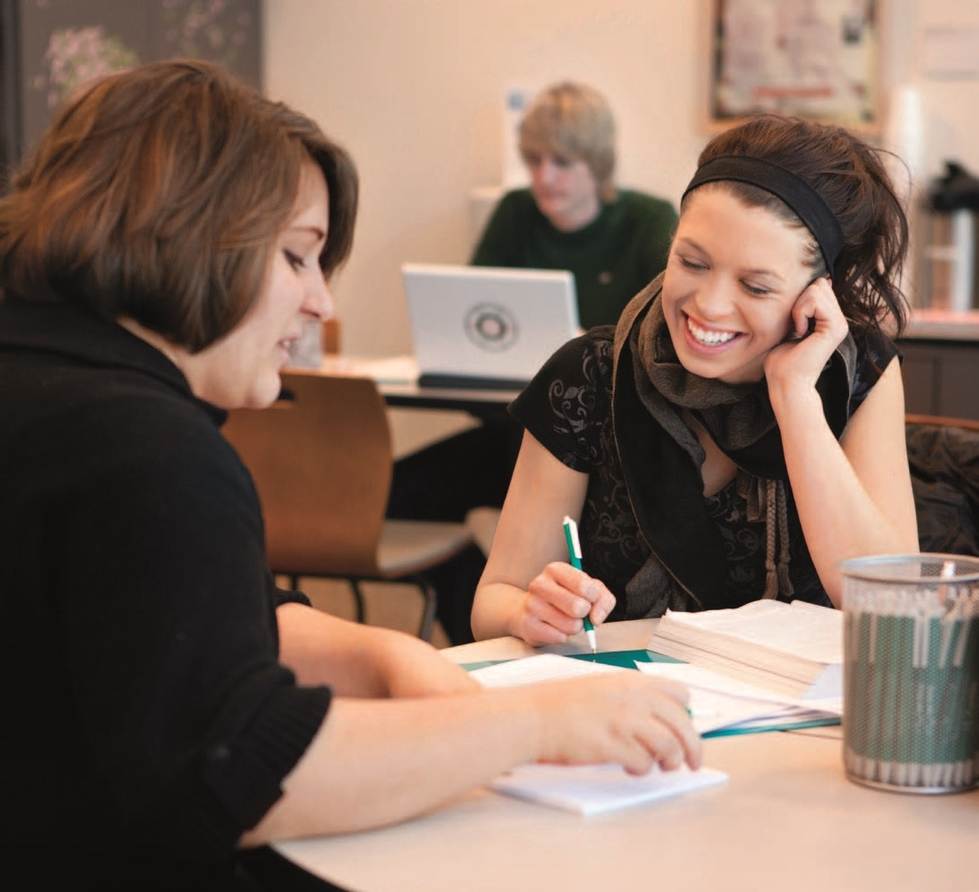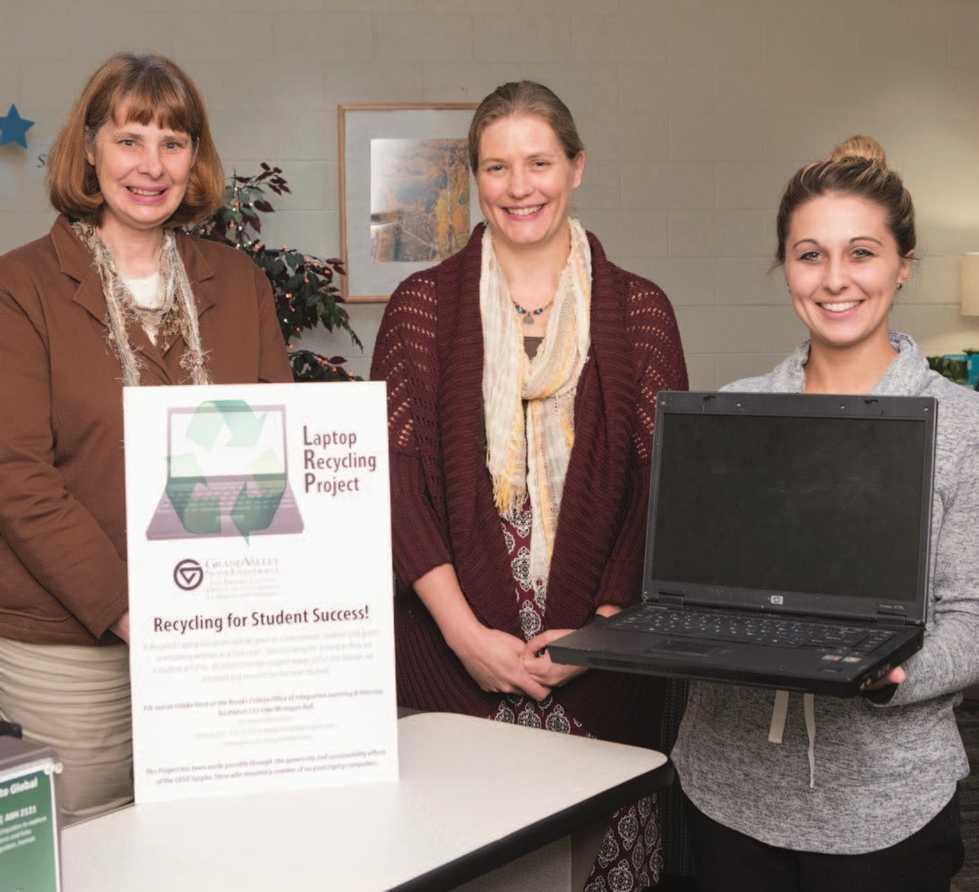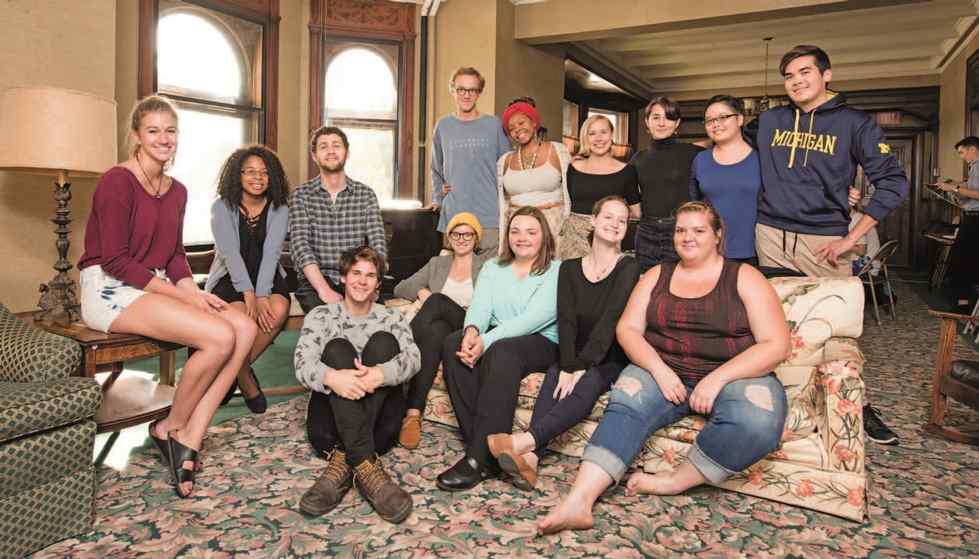Interdisciplinary Innovation
New Name for Area Studies: Area and Global Studies
According to Area and Global Studies Director Steeve Buckridge, “The name change reflects the growth of the department and Grand Valley’s emphasis on global learning.”
“It’s also similar in format to other universities, making it easily identifiable for students,” Buckridge said.
The name change took effect at the beginning of the 2016-2017 academic year, and a week of events in November officially celebrated the program’s newest major: global studies and social impact. The highlight of the week
was a keynote lecture by Arifa Javed, professor of sociology at the University of Michigan-Dearborn.
Javed screened her documentary, Essential Arrival: Michigan’s Indian Immigrants in the 21st Century, which spotlights the contributions and successes of Michigan’s Indian immigrant community.
Housed in the Brooks College of Interdisciplinary Studies, Area and Global Studies coordinates seven programs: African/African American studies minor, Chinese studies major, East Asian studies minor, global studies and social impact major, Latin American and Latino/a studies minor, Latino/a studies certificate, and Middle East studies minor.
Enthusiastic Students Embrace Human Rights Minor
More than 40 students enrolled as human rights minors in the program’s inaugural year — a start to the program that Director Richard Hiskes calls “epic.”
Hiskes, professor of political science and honors, was quick to point to two factors that led to a solid start for one of the newest academic minors in Brooks College.
“There was a lot of groundwork already underway on campus focused on human rights,” Hiskes said. “Students want to do something meaningful while at Grand Valley, so they were ready for this.”
The minor is truly an interdisciplinary effort, as students can choose elective courses from 18 different departments and core courses from five: criminal justice, history, political science, liberal studies, and African/African American studies.
Seven students graduated with minors in human rights during the April commencement ceremonies, and Hiskes said students have completed internships in Lebanon
at a Syrian refugee camp, in Washington, D.C., at a congressional office, and locally at a refugee service agency and a legal assistance center.
“Internships are not required for the minor, but there are so many organizations in Grand Rapids that do this type of work, our students will be able to find meaningful internship placements, if they choose,” he said.
Hiskes hosted a series of popular Hollywood movies
to help kick off the minor and make the vast topic of human rights tangible to students. Films like Blood Diamond, The Good Lie, and McFarland, USA
brought forth issues of child soldiers, refugees, and migrant rights, respectively.
Plans for the 2017-2018 academic year include continuing to sponsor or co-sponsor visiting speakers on campus and offering students a new course, The Sociology of Human Rights.
“ There was a lot of groundwork already underway on campus focused on human rights. Students want to do something meaningful while at Grand Valley, so they were ready for this.”
— Richard Hiskes
Two Certificate Programs Expand Students’ Skill Sets
Grand Valley students have two new opportunities to expand their professional skill sets during their time at the university. To help translate their skills to the workplace, students can earn the liberal education and professional skills certificate (LEPS). Students also have the ability
to expand their knowledge of an increasingly important population through the Latino/a studies certificate.
The LEPS certificate provides students with majors in liberal arts and sciences and interdisciplinary studies the opportunity to develop workplace skills.
Ellen Schendel, associate dean of Brooks College of Interdisciplinary Studies, said this certificate helps students build a portfolio.
“We want students thinking about their classes, but
we also want them thinking about what they’re doing next,” Schendel said. “The certificate helps them create
a resume, build a portfolio, and position themselves for future jobs.”
The Latino/a studies certificate will increase the student’s knowledge of the history of Latino/a culture. David Stark, coordinator of the Latin American studies program, said the program will prepare students to work with Spanish-speaking people from Latin American or Caribbean heritage.
“Every student can benefit from this certificate. West Michigan has a large Latino population, and students
will encounter Latino and Hispanic members of society throughout their careers,” Stark said.
The Latino/a studies certificate gives students the opportunity to connect with a greater understanding, Schendel explained. Some students may not know much about the culture, while some Latino/a students may participate in it to further their own identity.
Together, these certificates give Grand Valley students more tools before graduation.
“There are endless benefits to a liberal education, and we must make sure students know how to communicate those benefits to their employers,” Schendel said. “By giving them these opportunities, we can help them create a successful future beyond Grand Valley.”
WGS Research Program Builds Community
A pilot program within Women, Gender, and Sexuality Studies is furthering the sense of community among students who are majoring in the discipline.
Danielle DeMuth, associate professor and chair, said seven upper-division students were hired in the fall and winter semesters as peer mentors to provide research assistance to lower-division students enrolled in WGS 200 – Introduction to Gender Studies.
DeMuth said WGS faculty based this model on the success of peer consultants in the Fred Meijer Center for Writing and Michigan Authors and Knowledge Market research consultants. The Knowledge Market is a collaborative partnership among Grand Valley’s Speech Lab, Meijer Writing Center, University Libraries, and Data Inquiry Lab.
WGS peer research mentors were trained by Gayle Schaub, liaison librarian, and then assigned to faculty members. Each student enrolled in WGS 200 met with a peer research mentor to discuss a common assignment and research strategies toward completing it.
“It was so great to see our students sharing their knowledge and learning together,” DeMuth said.
The WGS 200 assignment is among the first steps in learning to build an annotated bibliography, DeMuth said, adding that it also provides students with an initial glance into
the world of academic research.
“We’re involving our upper-division students in research mentorship, while providing them with a deep learning experience,” she said.
DeMuth gave credit to Susan Mendoza, director of the Office of Undergraduate Research and Scholarship, for bringing forward the idea of incorporating peer research mentors into the WGS curriculum. The program will continue next year.
Writing Initiative Promotes Linguistic Diversity
An initiative championed by Grand Valley’s writing programs promotes linguistic diversity across campus.
Patrick Johnson, director of the Fred Meijer Center for Writing and Michigan Authors, said the initiative gained momentum after a January Teach-In session that examined policy statements by professional associations. Statements by the National Council of Teachers of English and American Association for Applied Linguistics affirm students’ rights to their own languages and advise educators to recognize the rule-governed nature and cultural value of multiple dialects.
Johnson and Lindsay Ellis, associate professor of English and director of Writing Across the Curriculum (SWS), said that respecting the legitimacy of African American language systems and celebrating multilingualism are not new concepts. The NCTE policy statement was first published in 1974.
Ellis said this initiative follows the university’s inclusion values as it “teaches writing in ways that include and instruct speakers of all languages and dialects.”
Johnson said encouraging linguistic diversity may not change what faculty expect from student writing, but raising awareness of other language varieties may change how both students and faculty discuss the writing process.
“Respecting the difficulty of code-switching and believing that all language varieties belong here will enrich campus for everyone,” he said.
Johnson said 100 peer consultants from the Knowledge Market underwent training in January on linguistic diversity and contrastive analysis. The sessions conducted by the Division of Inclusion and Equity staff members and campus linguistics experts helped peer consultants understand and respect the complexities of language, culture, and identity, he added.
Training was also held in the winter semester for faculty members who teach SWS courses.
Ellis called Academic Written English (AWE) the language of power in certain circles. “We want all students to be able to wield this power, but AWE is only one of the dialects that students may need to transform their lives, their professions, and the communities that matter to them,” she said.

Writing consultant assists student with writing skills.
Laptop Loan Program Helps Students Manage Financial Cost of Attending College
Several campus departments have partnered to ensure that eligible students who find themselves in a computer emergency can apply for a free, loaned laptop.
Anita Benes, office coordinator for Brooks College Office of Integrative Learning and Advising, said the idea to establish a loan program came to her when her own laptop died.
“One day a student came to the office and was very sad because her computer had died, and she did not have enough money to replace it,” Benes said. “I could certainly relate.”
Benes contacted the GVSU Surplus Store to explain the program, and Kim Patrick, director of procurement services, agreed to donate five laptops. David Potter from Adult and Continuing Studies also supplied five laptops and offered to be the tech support for the recycled computers.
To apply for a free laptop, students must be Pell grant recipients, prove financial need, or be a student veteran. Eight laptops were loaned out to students during the 2016-2017 academic year.
Benes said this project fits well within the Brooks College of Interdisciplinary Studies’ mission to promote sustainability. “About 4 million tons of computers and related devices are filling landfills each year,” she said. “I’m glad we can recycle these laptops.”
Students who meet the laptop loan criteria can apply for one at the Office of Integrative Learning and Advising, Lake Michigan Hall, room 133.

From left to right are Anita Benes, Jennifer Jameslyn, and graduate assistant Emily Smigiel. Benes initiated the laptop loan program offered through the Office of Integrative Learning and Advising.
ScholarWorks Downloads Reach New Record
Senior projects created by Frederik Meijer Honors College students have been downloaded more than 76,000 times through the ScholarWorks@GVSU portal over the last year, setting a new download record.
Matt Ruen, scholarly communications outreach coordinator for University Libraries, said the recent numbers are staggering. In 2015, senior projects were downloaded 48,709 times. There were more than 69,000 downloads in 2016.
“It makes us incredibly proud,” Ruen said. “These numbers can show students that the work they do has a direct impact on people throughout the world.”
ScholarWorks, created in 2008, enables Grand Valley students, faculty, and staff to share their work online. Students can choose to share their work within the Grand Valley community, or they can allow that work to be accessible to anyone in the world.
Since 2008, people in 201 countries and territories have downloaded an honors senior project from ScholarWorks. The U.S. leads downloads with 75,752. Projects have been downloaded more than 5,000 times in the United Kingdom and more than 3,000 times in Canada.
“At its core, ScholarWorks exists to share Grand Valley’s work with the world,” Ruen said. “By giving students a way to share their work, we are empowering their success.”
Jeff Chamberlain, director of the Meijer Honors College, said ScholarWorks is enabling honors students to share relevant research much more widely.
“Traditionally, you’d write a thesis, get it bound, and it would sit on a shelf gathering dust,” Chamberlain said. “With ScholarWorks, the projects are not static anymore.”
Honors senior projects are diverse; some students conduct original research, and they are encouraged to create something they are passionate about. They are given a choice to opt in to ScholarWorks, and they can manage who can access their project.
Google and Google Scholar are the main ways readers reach ScholarWorks, Ruen said. While he encourages most students to share their work with anyone in the world, he said there are benefits to only sharing it within the Grand Valley community.
What are those benefits? For Chamberlain, the biggest benefit is giving students a way to share their work with anyone.
“It’s just phenomenal that we can help students publish their work for free,” Chamberlain said. “Now, I’m waiting for a download to pop up in Antarctica.”
Pilot Cohort Completes Semester in Detroit
Six Grand Valley students spent their fall semester in Detroit, immersed in a program that focuses on the city’s history, culture, and community activism.
They are part of an 18-member cohort enrolled in the Semester in Detroit (SID) program, operated by the University of Michigan. This is the first year Grand Valley has participated. Anne Hiskes, dean of the Brooks College of Interdisciplinary Studies, said the opportunity offers students a unique, place-based experience.
The SID cohort was housed in two residences located in the Cass Corridor and Woodbridge neighborhoods. Students from Grand Valley and University of Michigan took most classes together and were required to serve internships with Detroit organizations.
Hiskes said she hopes students develop a deep understanding of challenges that face urban communities and develop skills for addressing issues like race and class. “I hope they are inspired by the community resilience and sustainability initiatives they observe,” she said. “As an immersive, cohort experience, the program is structured to be absolutely transformative.”
Liberal studies major Dana Eardley said living and learning with a small group of people lends itself to this type of community-based program.
“Living together enriches our learning experience because we are able to continue our discussions outside of the classroom,” Eardley said. “Members of our cohort are passionate about a variety of social issues. I appreciate that our program encourages us to gain an understanding of how these issues intersect.”
Eardley’s internship was at D-Town Farm, a program of the Detroit Black Community Food Security Network. (Read more about Eardley on page 28.)
Angela Paget, a geography and sustainable planning major, completed an internship with the Greening of Detroit, an organization dedicated to promoting healthy urban communities through green spaces, education, and job training. Paget is developing a composting system for use by neighborhood residents and helping to plan field trips for K-12 students.
Paget said she’s enjoyed learning more about Detroit’s history through seminar-style lectures and readings. “There is more individual preparation before class and more interactive learning in the classroom,” she said.
Craig Regester, associate director and on-site coordinator for SID, said the Grand Valley students enhanced the program’s diversity with their experiences and perspective. Grand Valley students who participated include Eardley, Paget, Kelsey Stephenson, Stephanie Balke, Mary Eakins, and Ryan Samosiuk.

Semester in Detroit cohort
